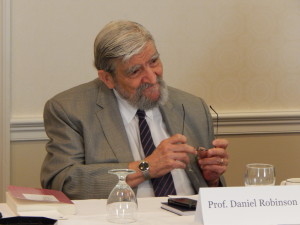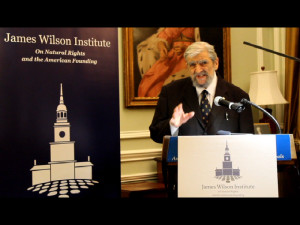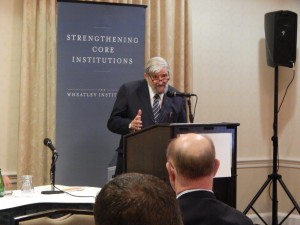×
Search
Remembering Daniel Nicholas Robinson (1937-2018)
By The James Wilson Institute •
Posted on Sep 19 2018
With heavy hearts, we share Prof. Hadley Arkes's reflection on the passing of his lifelong friend and James Wilson Senior Scholar, Prof. Daniel Robinson:
I write, just past tears, to convey the sad news of the death of my dearest friend of 50 years, Daniel Nicholas Robinson. Dan died Monday night September 17, on the 51st anniversary of his marriage to Francine. He died of congestive heart failure, at the age of 81. We thought that he was on the verge of death a month ago, but with children and friends gathered around, and prayers springing from many quarters, he rallied. When I visited him in the hospital then I took with me four of his books, and I read to him some of my favorite passages. That triggered smiles and the speaking again of telling sentences—and paragraphs. He had refused medication earlier, but he accepted the medication again. And we thought he might get well again. But he in turn tried to ward us off from holding out romantic, unrealistic schemes. He could still see the world, and things, as they are. He was just exhausted, and ready to go. And his friends have the hope that he will be rejoined now with his beloved Mother and Father.
Few of us could say that we have made better use of our years. He wrote 18 books, scores of articles, and touched thousands of lives with his writings and lectures. His lectures for The Teaching Company on the History of Philosophy can be found in virtually every library in the country now. I know their effect in leading many people to graduate school—or simply delighting people as they learned anew of some of the best things said and thought in the history of serious reflection. Those lectures, and those writings, will live on to touch and inspire generations yet to come. But even right now: I would encourage people to go on the net, make their way to YouTube, and punch in "Daniel Robinson" on Thomas Reid, or David Hume, or Immanuel Kant. These are lectures done at Oxford, and they are penetrating and witty—and free. They are sources of instruction and delight that may be heard at any time.
It was through Dan, many years ago, at Amherst, that I was led along the path of reflection that led in turn to the Catholic Church. And when I came into the Church in 2010, he was there with me to do one of the readings. But long before that, I did a book called First Things (Princeton 1986), and that book was dedicated to Daniel Nicholas Robinson. We became fast friends at Amherst College, as young professors clinging to each other during the exploding troubles on the campuses in 1969-70. We held together, in disbelief and resolution, as we beheld senior faculty losing their nerve, and no longer seeming to believe in the enduring worth of what they were teaching. What I said about Dan in the preface to that book may stand again today, as he leaves us:
" Since the time I began to teach on the questions in this book, almost every section of the project has been the topic of an extended discussion with Daniel Robinson, over coffee at night, on the long-distance wire, or during rambling walks through the streets of Georgetown. He continues in that rare office of friend and tutor. He has ever been my most eager audience and my most pointed—and benign—critic. It may be strange to confess that almost every conversation we have had over the past 15 years [1970-85] has touched, in one way or another, on the enduring arguments, reflected in these pages, over contingent and necessary truths and the ground of our moral understanding. That curious fact may stand as the measure of this friendship. He has preserved an interest in this book in all of its phases; and apart from my own, gifted teachers, no one has contributed so broadly and persistently to the understanding that informs these pages. For these reasons—and more—this book is dedicated to him."
H.A.
Amherst, Massachusetts
March 1985
In addition to his role as a Senior Scholar leading seminars for our James Wilson Fellows, Prof. Robinson delivered two public lectures for the James Wilson Institute. In 2017, he spoke on "The Scottish Enlightenment and the Foundation." In 2016, he spoke on "Is There Anything 'Essentially' Human?: James Wilson's Critique of Locke." Videos of both talks may be found by clicking on the pictures above.



